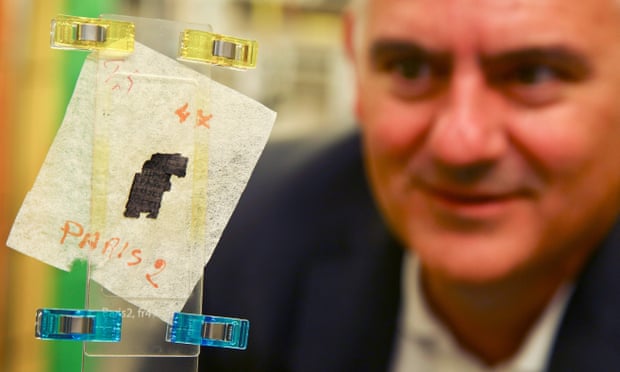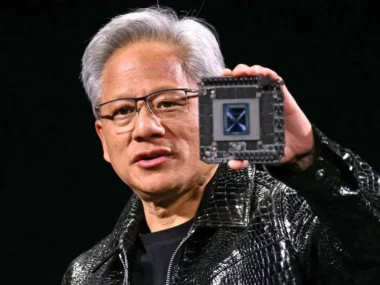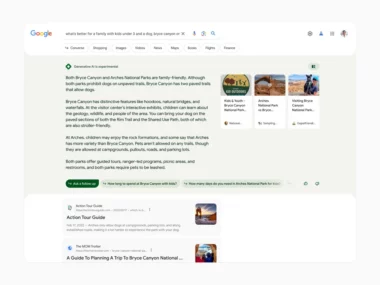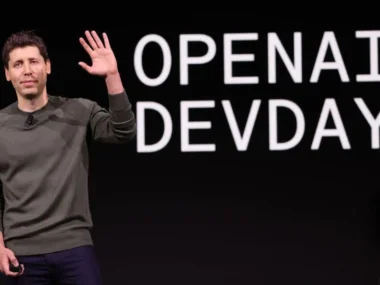A “potential treasure trove for historians” at the University of Kentucky has challenged computer scientists to decipher the contents of carbonised papyrus.
When the eruption of Mount Vesuvius’ blast reached Herculaneum in AD79, it buried the Roman town in ash and pumice and burned hundreds of antique scrolls to a crisp in the library of a lavish mansion.
The catastrophe seemed to have permanently destroyed the scrolls, but almost 2000 years later, experts were able to read deep inside the fragile, charred remains and extract the first word from one of the writings.
Prof. Brent Seales, a computer scientist at the University of Kentucky, and colleagues who started the Vesuvius challenge in March to speed up the reading of the writings made the revelation on Thursday. The project, which is supported by Silicon Valley investors, offers cash prizes to scholars who are able to decipher the language from the carbonised scrolls.
“This is the first recovered text from one of these rolled-up, intact scrolls,” said Stephen Parsons, a staff researcher on the university’s digital restoration effort. Since then, more letters from the antiquated scroll have been discovered.

Seales and his team published thousands of 3D X-ray photos of two rolled-up scrolls and three papyrus fragments to kick off the Vesuvius challenge. They also made available an artificial intelligence programme that they had trained to decipher the scrolls’ letters based on the slight alterations the ancient ink had made to the papyrus’s structure.
The scrolls, which are among hundreds found in the library of the villa believed to have belonged to a senior Roman statesman—possibly Lucius Calpurnius Piso Caesoninus, Julius Caesar’s father-in-law—belong to a collection maintained by the Institut de France in Paris.
Luke Farritor in Nebraska and Youssef Nader in Berlin, two computer science students who took on the Vesuvius challenge, improved the search method and separately discovered the same ancient Greek word in one of the scrolls: “oc,” which means “purple.” Farritor, who discovered the word first, earns $40,000, and Nader takes home $10,000.
The race to decipher the surrounding text has begun. Three lines of the scroll, each comprising up to 10 letters, may already be read, according to Dr. Federica Nicolardi, a papyrologist at the University of Naples Federico II. She expects that more lines will soon be readable. There are at least four text columns visible in a recent passage.
This phrase conjures up images of monarchy, luxury, and even derision, according to Seales: “This word is our first dive into an unopened ancient book.” “What will the setting reveal? In his “natural history,” Pliny the Elder investigates “purple” as a method for creating Tyrian purple from shellfish. According to Mark’s gospel, Jesus was made fun of while he was dressed in purple garments before being crucified. It is still unclear what this particular scroll is about, but I anticipate finding out shortly. It’s amazing to be a part of an old, new story that begins for us with the word “purple.”
The Herculaneum scrolls are of enormous interest since they are the only complete library that have survived from antiquity. Ancient Greek is the language of the majority of the manuscripts studied so far, however some may be Latin. Fragments have provided information on Hellenistic dynasty history as well as letters from Philodemus’s treatise On Vices and the Opposite Virtues.
“The strong suspicion is that the non-philosophical part of the library remains to be discovered, and here fantasy runs riot: new plays of Sophocles, poems of Sappho, the Annals of Ennius, lost books of Livy, and so on,” said Robert Fowler, an emeritus professor of Greek at the University of Bristol. It would also be fantastic to discover so-called documentary papyri, such as letters, business documents, and other types of documents; they would be a gold mine for historians.
Seales continued, “For me, reading sentences from the Herculaneum scrolls is like stepping upon the moon. Sincerity tells me that I was aware that the text was waiting for us to get there, but that arrival only occurs at the very last step. Reading the words is that step into unknown ground, and we’ve taken it with such a skilled crew at work. It is now time to go exploring.











